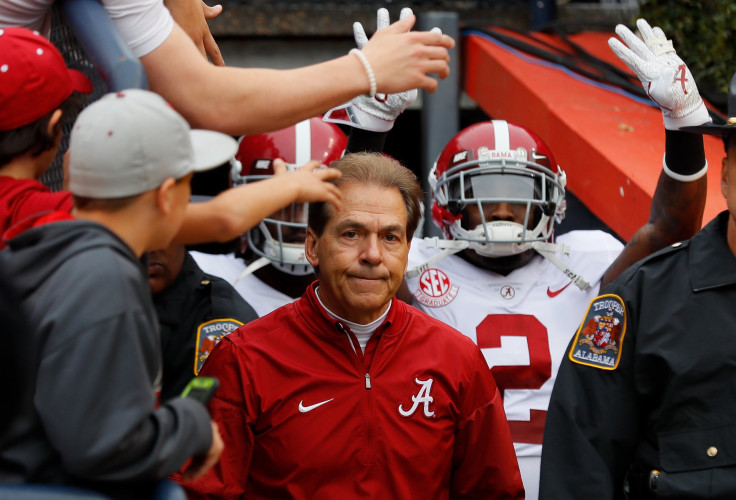How Top College Football Programs Are Fighting Racial Injustice
The conferences that are going forward with college football in 2020 are hoping to use their platform to affect positive social change.
With the Pac-12 and Big Ten postponing fall sports because of the coronavirus pandemic, there could be even more attention paid to the remaining Power Five conferences. The Big 12, ACC, and SEC are all addressing the racial unrest in the country in some way as teams get ready to take the field.
Teams from the Big 12 and ACC are set to start their respective seasons this week. The SEC starts a 10-game, conference-only schedule on Sept. 26.
Big 12 commissioner Bob Bowlsby said Monday that the conference is instituting an anti-racism campaign. Each school will include a unity message as part of its pregame show, and two public service announcements are set to be broadcast during each Big 12 game.
It’s possible that some Big 12 players will find a way to protest before games start. Players are usually in the locker room while the national anthem is performed, but some schools might decide to have the team on the field during the pregame ceremony.
“I think there'll be a lot of different recognitions of their profile and their concerns and we – within some latitude – we encourage those things and want to make sure that student-athletes can find their voice and use their voice,” Bowlsby said. “Yet we also have to manage it so that they're there or not significant disruptions of the contest as well.”
Bowlsby said the Big 12 is working to make progress in eliminating systemic racism, supporting a voter registration program and instituting an internship program for people of color.
“We have engaged the chief diversity officers from each campus,” Bowlsby said. “In an advisory group for us we've assembled a Black student-athlete council that's one male and one female student-athlete from each campus that works with the diversity officers and works with the other universities.”
There has already been a demonstration on the field during a game. Stephen F. Austin players incurred a delay of game penalty before kickoff as they took a knee and raised their fists in solidarity with the fight for racial justice.
That came during an FCS football game, a much smaller stage than any contest between a pair of Power Five schools. Before the conference’s season was postponed, Big Ten Commissioner Kevin Warren said athletes would be allowed to kneel during the national anthem.
Players from @SFA_Football kneel in unison and take a delay of game penalty to send a message of equality for all. pic.twitter.com/ptwjqLgNBg
— ESPN College Football (@ESPNCFB) September 6, 2020
The ACC formed its Committee for Racial and Social Justice in July. Last week, the conference announced three initiatives for the upcoming fall sports seasons.
There will be mandatory diversity and inclusion training for student-athletes, athletic departments and ACC staff. The conference has created the ACC Unity Symbol, which will be displayed in venues and on video boards as a representation of solidarity among the conference’s schools. The ACC also announced that its unity statement will be read prior to every game.
“The ACC Committee for Racial and Social Justice will work both internally at the league office, and externally with our 15 member institutions, to develop and implement action items to combat racism and social injustice within our society,” ACC Commissioner John Swofford.
“Our committee will also work collectively with our ACC SAAC and staff from each of our schools to educate, empower and encourage our student-athletes to be a voice of change. The ACC remains committed to upholding the values of equality, diversity and non-discrimination,” he added.
Athletes across all sports have used their voices to speak out against racism and police brutality. Games in the NBA, NHL and MLB were postponed two weeks ago in the aftermath of the shooting of Jacob Blake by a Wisconsin police officer.
Alabama head coach Nick Saban led his players in a march for social justice as professional athletes were sitting out games. Players from other SEC programs boycotted practice.
On Aug. 20, the SEC announced the creation of the SEC Council on Racial Equity and Social Justice. Consisting of student-athletes, administrators, coaches and SEC staff, the council aims to discover ways to promote racial equity and social justice while also fostering diversity and helping overcome discrimination in college athletics.
“With the Council as our guide, we will develop an action agenda built on the foundation that all are created equal and ensure this truth echoes across our stadiums, our arenas, our campuses, our communities, our states and our nation,” SEC Commissioner Greg Sanke said last month.
The council plans to focus on helping to increase access and representation for underrepresented minorities, improve education and raise awareness on racial and social issues.

© Copyright IBTimes 2024. All rights reserved.






















